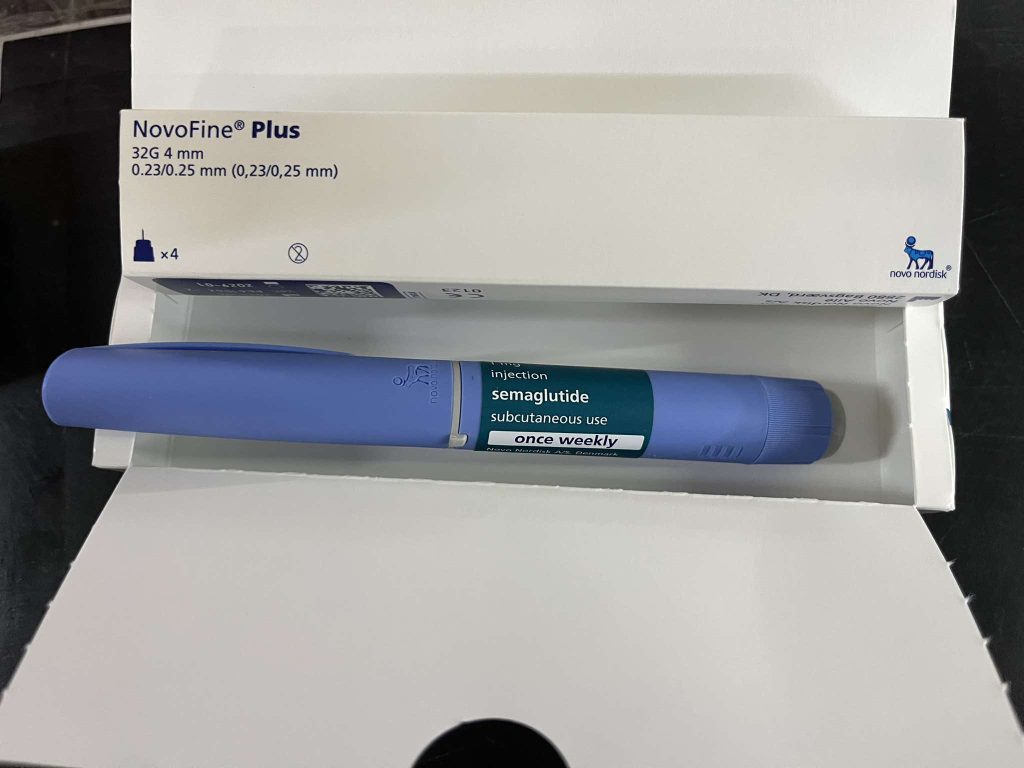
By now you’ve probably heard of the Ozempic diet. The question is: does it work?
As someone who’s currently doing it, I’d say it’s pretty much effective for me. But it’s not really supposed to be a stand-alone solution if you have weight issues. I’ll explain more.
Disclaimer: I’m currently on my 3rd shot. This is not a supposed to be a short-term treatment plan. You have to do at least 12 weeks treatment to get your desired results out of the Ozempic diet plan.
What is Ozempic and How Does it Work?
Ozempic (generic name: semaglutide)
Ozempic comes in 3 presentations – 0.5mg, 1mg, and 2mg. It looks similar to an insulin pen.

Ozempic is a prescription medication and should only be used under strict medical supervision. It may have side effects and is not suitable for everyone.
Ozempic works through several mechanisms:
- GLP-1 receptor agonist: Ozempic is a glucagon-like peptide-1 (GLP-1) receptor agonist. It mimics the action of the natural GLP-1 hormone in the body.
- Appetite suppression: It acts on the brain’s appetite control centers, reducing hunger and increasing feelings of fullness. This leads to reduced calorie intake.
- Slowed gastric emptying: Ozempic slows down the rate at which food leaves the stomach, contributing to a prolonged feeling of “fullness”.
- Blood sugar regulation: It stimulates insulin release and reduces glucagon secretion when blood sugar levels are high, which can help with weight management, especially in people with diabetes.
- Metabolic effects: Ozempic may have additional metabolic effects that contribute to weight loss, such as increased energy expenditure.
Clinical trials have shown that Ozempic can lead to significant weight loss in many individuals, often around 10-15% of body weight over a year when combined with lifestyle changes. However, the exact amount of weight loss can vary between individuals.
Additionally, for optimal results, adopt a healthy diet and perform regular physical activity.
I Don’t Have Diabetes. Can I Still Take it? Can I Still Do the Ozempic Diet?
A person without diabetes can still take Ozempic (semaglutide) for weight loss purposes, but there are important things to consider before doing so.
- There’s an alternative: In 2021, the FDA approved a higher dose version of semaglutide (brand name Wegovy®) specifically for chronic weight management in adults with obesity or overweight with at least one weight-related comorbidity. If you’re taking Ozempic for weight loss purposes, you might want to consider taking Wegovy® as an alternative.
- Medical supervision: It should only be used under the guidance of a healthcare provider, as they need to assess if it’s appropriate based on an individual’s health status and medical history. I’m currently doing the Ozempic diet under the strict supervision of my licensed physician wife. I believe she is the very definition of strict.
- Eligibility criteria: Typically, it’s prescribed for obese adults, those with a body mass index (BMI) of at least 27 (overweight) or 30 or greater (obese) with at least one weight-related comorbidity (e.g., high blood pressure, high cholesterol, sleep apnea). I am almost all of the above except for a high cholesterol. But then again, I might be in denial.
- Not a first-line treatment: It’s usually considered after diet and exercise have been tried without sufficient success. I’ve tried so hard. At 45, my metabolism isn’t anywhere near where I was when I was 38. That was when I started to balloon. And I didn’t just balloon, I became a blimp.
- Lifestyle changes: It’s meant to be used in conjunction with a reduced-calorie diet and increased physical activity.
- Long-term use: The medication is typically intended for long-term use, as weight may be regained if treatment is discontinued.
- Insurance coverage: Coverage for weight loss medications can vary, and some insurers may not cover it for non-diabetic individuals.
- Potential side effects: Users may experience nausea, diarrhea, vomiting, constipation, abdominal pain, headache, fatigue, and other side effects. The only side effect I seem to have noticed is a headache, but that was because I forgot to eat and became hypoglycemic in the process.
It’s crucial to have an in-depth discussion with a healthcare provider about the potential benefits, risks, and alternatives before considering this medication for weight loss. They can provide personalized advice based on an individual’s specific health situation and needs.
Don’t Just Depend on the Ozempic Diet to Lose Weight
Once again, let me just remind you that you should consult a physician before you get on the Ozempic diet plan. Make sure you follow the prescription to the letter and report any side effects immediately.
You should also change your diet and adopt a fitness regimen to increase the speed of weight loss. Here’s my diet plan. Please remember that this is designed specifically for me who is a 45-year-old man with a 28 BMI.
Diet Plan
- Reduce portion sizes gradually (Ozempic will help with appetite suppression)
- Aim for a moderate calorie deficit (300-500 calories/day)
- Stay hydrated: 8-10 glasses of water daily
- Limit fatty meat (lechon, crispy pata), white rice, white bread, and soft drinks.
- Eat more fruits, vegetables and fiber rich food.
- Stay away from the kitchen past 11PM unless you’re going to wash dishes or drink water.
Exercise Plan
· Cardio
30 jumping jacks and brisk walking daily around the subdivision. This is good for your cardiovascular system. And as a singer, helps improve your lungs for better performances onstage. (30-45 minutes, 4-5 times/week)
· Strength and Muscle Training
30 pushups spread throughout the day in sets of 3 with 10 reps per set. 100 squats, same. Lunges, same. Sit ups, same.
This is important to help tone the body as you gradually lose fat. Helps reduce excess skin hanging off of the areas where you lost weight the most. Increase the number of sets with he same number of repetitions as your strength improves.
Please consult a physician and a certified physical trainer before you do these exercises.
· Flexibility
And Asian squat 10 minutes per session for up to 6 sessions spread throughout the day.
Stretching. Do gentle stretching exercises and do not force yourself beyond your limits. You want to be flexible not injured.
Lifestyle Changes
- Get as much sleep as you can.
- Meditate or do breathing exercises if stressed.
- Focus on non-food activities.
- Get off your phone and become more physically active.
Monitoring Progress (Not Yet Done)
- Keep a food and exercise journal
- Track weight and measurements weekly
Adjust if necessary to improve weight loss. Remember that Ozempic is an aid in your weight loss journey. Consistency with diet and exercise is key to long-term success.
Conclusion About the Ozempic Diet
They say life begins at 40. They should’ve also included that your ability to metabolize food ends at 40. I was always confident that I could lose all the weight I gained by working out.
I managed to shave a few pounds before getting married at 40 but almost immediately gained it all back when the pandemic hit.
With nothing to do but eat and stay home, I quickly gained unwanted weight.
I knew I was in trouble when my dad kept commenting that I was way too big.
Becoming a dad didn’t help as I shoveled the proportionate amount of food into my mouth as the amount of food I fed my son. Learning how to cook and enjoying the fruits of my labor in the kitchen also helped compound the fattening effect.
I first heard of the Ozempic diet through my cousin and my wife and I wanted to go buy pens for ourselves but practical reasons prevented us to do so. We finally took the plunge nearly a month ago and have not regretted that decision.
I must say though that I am still waiting for enough results to say that it really works. For now, it serves its purpose as an appetite suppressant really well. The moment I lose 40 pounds or so or at least get back to my fighting weight of 155 pounds, then I’ll say the Ozempic diet is a success.
Are you interested in the Ozempic diet? Send us an email or call to order here.
